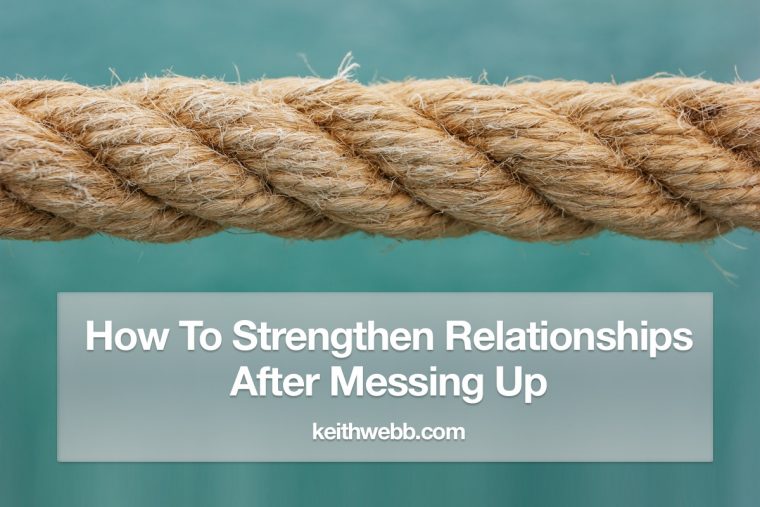We all mess up from time to time – we say the wrong thing, fail to fulfill a commitment, or make the occasional bad decision. We worry about messing up, but no one expects you to be perfect. It’s how you respond to your failures that builds or breaks trust with those around you. Here’s how to strengthen relationships after messing up.

Compare the responses of these two leaders who messed up:
Vivian had the responsibility to find the location and negotiate the price of the venue where we would hold an event. Two months before the event, when we are ready to announce it, we found out Vivian hadn’t found a location. Our planning group was astonished. Vivian said she had been busy, complaining, “I am the person in our group doing the majority of work!”
Robert was in charge of the team to develop his department’s strategy. It was to be a team process, with all members giving input, reaching consensus, and drawing up the strategy. The first two meetings Robert facilitated discussions to draw out ideas and concerns. At the beginning of the third meeting, he revealed two large posters with a detail strategy drawn on them.
The group was shocked that Robert created the strategy on his own. At first he defended himself, “I only wanted to make a first draft using all our ideas. I thought it would help us to move forward.” The group told him it did not.
“I realize I have overstepped,” he said as he understood what he had done. “I made my vision the draft of the strategy. That must feel disempowering and cause you to wonder if you’ve wasted your time on this team. I apologize.” He took down the posters, crumpled them into a ball, and put up two new posters, “If you’re willing, could we continue working together?”
As you might predict, the responses to Vivian and Robert were quite different. Vivian’s coworkers were critical of her and noticed how she shifted blame when things didn’t go well. Pretty soon no one wanted to work with her. Robert, despite breaking initially breaking trust with his team, ended up building more respect and trust because of his response.
These two stories illustrate that you are judged more by how you respond to your mistakes than the mistake itself.
5 Steps To Strengthen Relationships After Messing Up
Robert’s response was satisfying to his team because he was sincere. Five important steps demonstrate your sincerity:
- Own your mistake. Take responsibility for your mistake, or your part of the mistake. Don’t worry about getting justice for other people’s parts. Own your part, and others will step up to theirs. Be clear and specific. “I was wrong to…” or “…when I…” Fuzziness when admitting your mistake causes listeners to question your sincerity.
- Own the mess you made. You messed up and the results affected other people. Own up to the mess you made. “I realize that I’ve put us all behind schedule.”
- Show empathy. Listening to and acknowledging how people feel about your mess is important to the healing and trust-rebuilding process. In Robert’s case, his team clearly told him how they felt and he acknowledged those feelings. If you haven’t heard from those affected you might ask them, “in what ways has this impacted you?”
- Apologize. The song says, “‘Sorry’ seems to be the hardest word…,” but I don’t think so. Saying “sorry” is easy, because we often have unspoken thoughts that follow:
• “I’m sorry… (you are being so sensitive right now).”
• “I’m sorry… (I got caught doing this).”
• “I’m sorry… (even though you’ve done worse things to me but never apologized).”
I like the two words: “I apologize.” Perhaps because “I apologize” stands out, it sounds more sincere. It certainly is more difficult for me to say than “I’m sorry.” Which probably means I’m more sincere with “I apologize” than “I’m sorry.” - Clean up your mess. Do what you can to clean up the mess you made. Don’t play the martyr trying to do it all yourself, you’re not doing penance. But don’t just apologize and leave the mess for others to clear up, either.
Here’s another example of all 5 steps in action:
“I was wrong when I pushed for a decision on the website design. As a result of my hurried decision we’ve hired the wrong person for the job and will need to start over. Like me, I’m sure you’re frustrated by this, even more so since you warned me not to move forward so quickly. I apologize for my impatience. I am ready to do what it will take to get the right designer and will move some of my discretionary budget to the project so we have the funds we need.”
When you do this 5 step process of responding to your mistakes, you move from breaking trust to building relationship. People will not only remember how you responded, they will use your response as a model for how to respond when they mess up.
How you respond to messing up can build more trust and loyalty than never making a mistake in the first place.
You can leave a comment by clicking here.


Please note: I reserve the right to delete comments that are offensive or off-topic. You own your comments but give me permission to use them. See My Comments Policy. Read my Permissions Policy to know how you can use my posts.